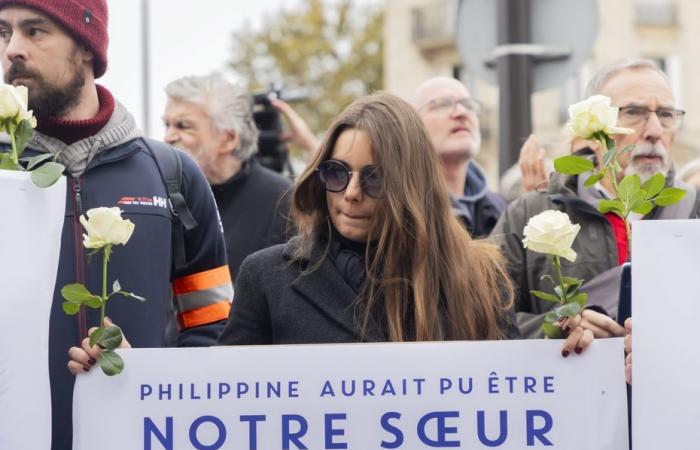According to figures from the Ministry of Justice, in 2023, 6% of those convicted of rape will reoffend. Following the murder of Philippine, Dominique Vérien, senator (UC) of Yonne, participated in an information mission to fight against this phenomenon.
Company
From daily life to major issues, discover the subjects that make up local society, such as justice, education, health and family.
France Télévisions uses your email address to send you the “Society” newsletter. You can unsubscribe at any time via the link at the bottom of this newsletter. Our privacy policy
An edifying figure. According to a report from the Ministry of Justice, in 2023, 6% of those convicted of rape will reoffend. This is a worrying phenomenon that Dominique Vérien wishes to fight against. This Wednesday, October 30, this senator (Centrist Union) from Yonne is therefore launching an information mission to combat this phenomenon.
This Wednesday, October 30, Senator Dominique Vérien launches the information mission to fight against the recurrence of rape and sexual assault
•
© J?R?MIE FULLERINGER / MAXPPP
What reasons justify the creation of this information mission?
Dominique Vérien : This was a request from the Socialist Party, following the murder of Philippine. The women's rights delegation decided to take up this subject, not only to examine the OQTF aspect (obligation to leave the territory), but also to understand what happens when a person is incarcerated for rape.
How can we ensure that a person convicted of gender-based and sexual violence is less dangerous when they leave prison? This is a question that we ask for terrorists, but not for rapists, even though the risk of dangerousness is present.
What do you plan to do during this fact-finding mission?
The Joux-la-Ville detention center in Yonne welcomes convicts aged one year and over who present “good prospects for reintegration”.
D.V : We began this fact-finding mission by going to the Joux-la-Ville penitentiary center (Yonne). It is a specialized prison for perpetrators of sexual offenses. We observed the way in which people are taken care of there. This also allows us to see all the limits of this system, since Philippine's murderer had been incarcerated there, without benefiting from any particular support.
We visited Joux-la-Ville and we will probably go to see other penitentiary establishments. We also met with the Judicial Youth Protection (PJJ) of Yonne. Among the young people she must follow, there are a large number of perpetrators and victims of sexual offenses. It is therefore implementing numerous initiatives, particularly regarding psychological monitoring.
► ALSO READ: A host family for more than 850 young delinquents: judicial youth protection is looking for volunteers in Franche-Comté
We have some perspective on psychotrauma and how it works. We know that if we are taken care of early enough, we can get through it. When you are a victim, you may not remain a victim. On the other hand, without rapid follow-up, we risk becoming or remaining perpetrators of sexual violence..
Concretely, what is Joux-la-Ville doing to support these people?
D.V. : 52% of people incarcerated there are for sexual offenses, which makes it a somewhat specialized prison. This facilitates psychological care, because they can work in groups with psychologists on basic themes such as their relationship with their body, their feelings, and their relationship with others.
Sometimes care is truly basic education. At the PJJ, we were made the same observation. Often, we must remember the limits to be respected in contact with others, because these notions are poorly understood.
Should this system be adapted to other detention centers?
Joux-la-Ville detention center
•
© SALESSE FLORIAN / MAXPPP
D.V :What we were able to observe in Joux-la-Ville is that when detainees are taken care of, we obtain results. It is also certain that this varies depending on the profile of the prisoner. We also noted that in this penitentiary center, psychological monitoring is done on a voluntary basis, encouraged by the possibility of sentence reduction.
However, many of them are in denial. They therefore do not see the point of following these sessions. The PJJ adopts a different approach: it strongly encourages young people to participate. She also found professionals willing to support them, even under duress. In this system, we notice that these young people rarely miss their appointments. They understand that it makes them feel good.
In many cases, the perpetrators were victims.
They rehabilitate themselves as victims. They also realize that what they did to the other is equivalent to what they suffered. They are indeed authors. So, it's quite restorative for everyone.
What do you hope for from the report you are going to submit?
D.V. : Thanks to this report, which will probably be delivered in March 2025, we hope to correct certain things. We must understand that there are a huge number of victims of sexual violence, and that we cannot consider letting potentially dangerous people return to normal lives if their dangerousness remains real.
We therefore want to move towards a type of treatment similar to that of terrorists. When a person convicted of terrorism has served their sentence, it is considered that they have also served the ideology that led them to such acts.
For rapists, it is not enough to say that they have paid their debt to society, especially if the simple fact of meeting a woman still triggers in them impulses to rape or murder. In this case, we must think before letting them out and providing real work in prison.






